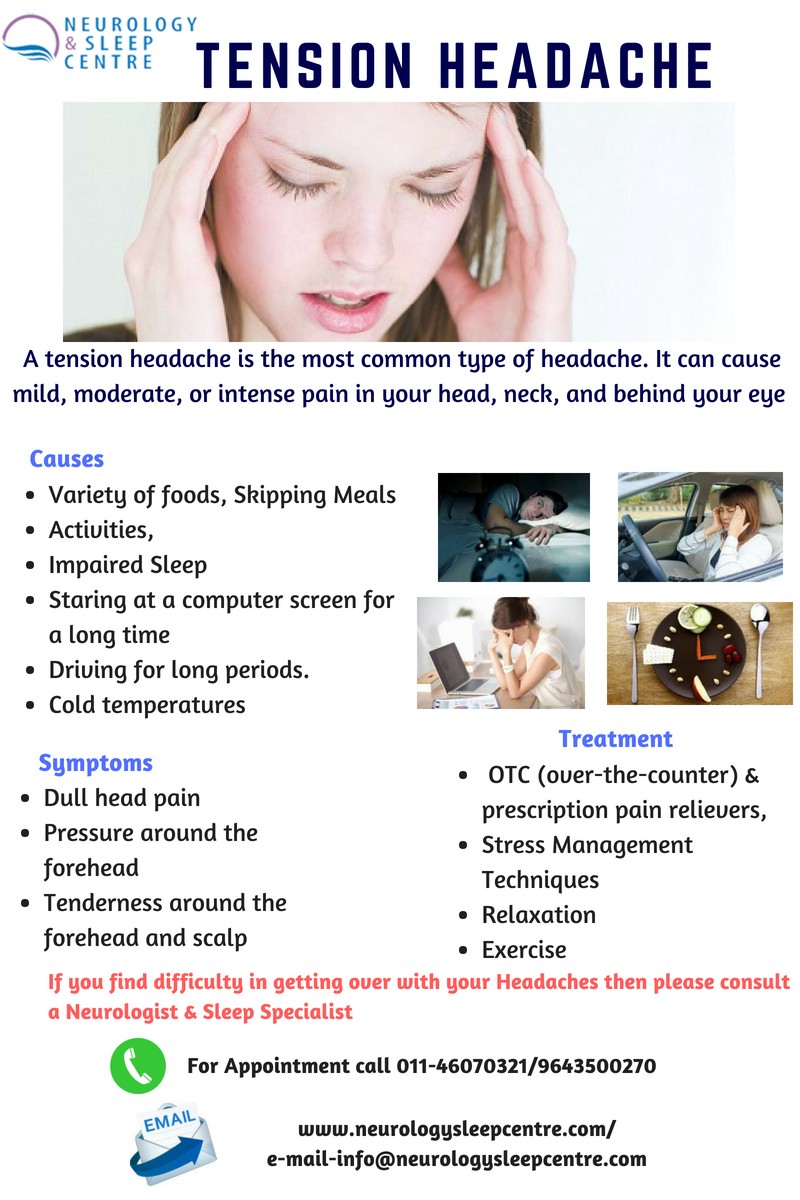
Contents
Tension Headache
Headache — a condition so common it’s often joked about, but when you’re experiencing one, it’s no laughing matter.
When discussing headaches, most people are referring to the most common type: tension headaches. Nearly half of adults experienced a headache in the past year, and fortunately, for most individuals, the headache was mild, short-lived, and likely a tension headache.
Children and teens can also experience tension headaches, with a significant percentage of children having experienced one by age 15. Females are more frequently diagnosed with tension headaches than males.
Tension headache definition and facts
- Tension headache is the most common type of headache.
- Possible contributing factors include stress, impaired sleep, skipping meals, light and sound sensitivity, nausea, vomiting, and throbbing head pain that worsens with exertion.
Signs and symptoms of a tension headache
Tension headaches typically occur infrequently and are usually short-lived, resolving within minutes to a few hours. In rare cases, the headache may last for many days. Tension headaches that occur more than 15 days each month are referred to as chronic tension headaches.
Tension headache pain
- The pain of chronic tension headache tends to vary in severity.
- The pain typically impacts the entire head but may begin in the back of the head or above the eyebrows.
- Some people experience a cap or band-like sensation around their skull, while others describe their pain as muscle tension in their neck or shoulders.
- The pain is often described as constant and pressure-like.
- The pain usually comes on gradually and is not incapacitating, allowing most people to continue their daily activities.
Other tension headache symptoms
- In some cases, people with tension headaches report sensitivity to light or sound.
Are tension headaches associated with symptoms of other types of headache?
Tension headaches are not associated with symptoms like nausea, vomiting, flashing lights, blind spots, or numbness or weakness in the arms or legs, which can help distinguish them from other types of headaches like migraines.
Causes of tension headaches
The exact cause of tension headaches is unknown, but factors like lack of sleep, skipping meals, increased stress, eye strain, muscular tension caused by poor posture, overexertion, and anxiety may contribute to their development. In children, headaches may be a response to changes in school or home situations like a new sibling, testing at school, or social isolation.
How to relieve tension headaches
Tension headaches are diagnosed based on the patient’s reported history and physical examination. Treatment options include prescription medications, over-the-counter pain relievers, combination drugs, and stress management techniques.
Home remedies that may provide relief include alternative treatments or therapies like hot compresses or ice packs, hydration, consuming flaxseed, inhaling the scent of peppermint or lavender oil, scalp massage, whole-body massage, stress management techniques, and exercise.
OTC medications for tension headaches
Many people treat tension headaches with over-the-counter medications like acetaminophen, ibuprofen, or combination medications containing acetaminophen, aspirin, and caffeine. However, overuse of these medications can lead to more frequent and severe headaches. Certain precautions should be taken with these medications, and chronic tension headaches may require prescription medications like antidepressants or antiseizure drugs.
Stress management techniques for headache pain
For individuals who experience recurrent tension headaches, stress management techniques like regular exercise, deep breathing, relaxation training, massage therapy, heat and ice therapy, and acupuncture may be effective. Identifying and avoiding headache triggers can also be beneficial.
Prevention of tension headaches
Preventing tension headaches involves identifying triggers and modifying or avoiding them. Establishing regular exercise and eating habits, practicing relaxation techniques, and eliminating stressful situations can help decrease or eliminate tension headaches. It is recommended to see a doctor if headache patterns change or if there is a sudden onset of severe headaches.
From
Migraines and Headaches Resources
- How I Went From Migraine Pain to Serenity
- What I Do to Manage Migraine Triggers
- Botox Injections for Migraine Treatment


